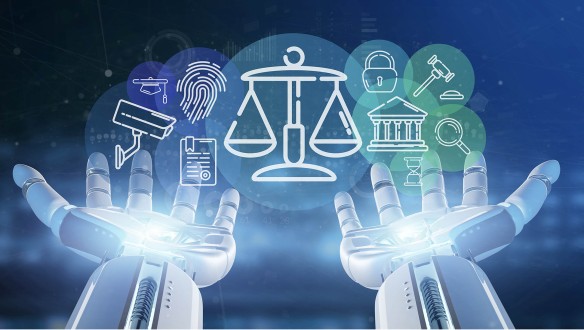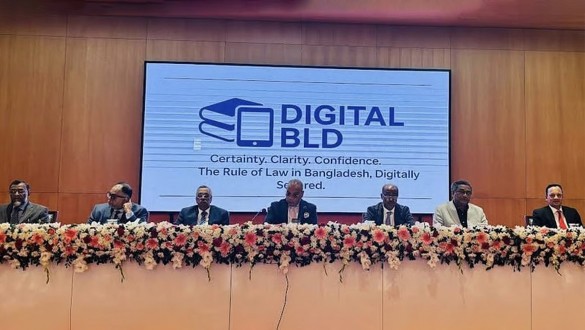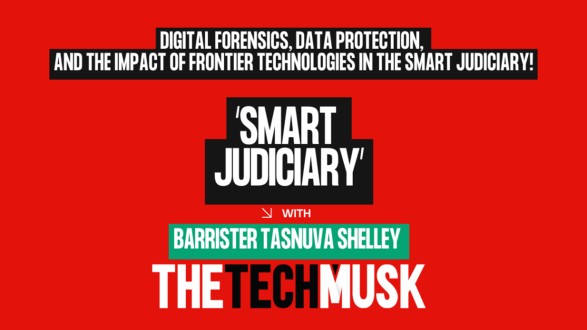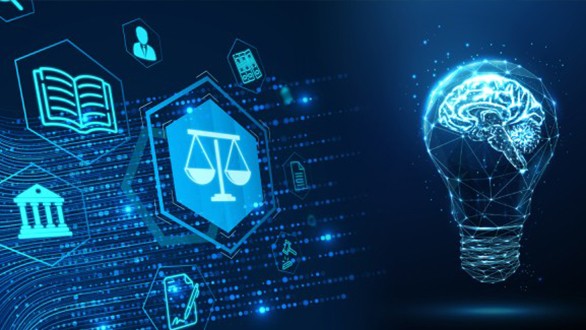
Artificial intelligence is transforming the legal profession in profound and practical ways. Legal practitioners worldwide are leveraging AI technologies to work smarter, deliver more accurate results, and reduce costs for clients. These tools are no longer experimental but becoming essential components of modern legal practice, automating routine tasks and augmenting human expertise. For Bangladesh's legal system, which faces unique challenges including judicial backlogs and uneven access to legal resources, AI adoption could be particularly transformative. By examining how AI is revolutionizing key areas of legal work globally, we can better understand its potential to modernize and strengthen Bangladesh's legal framework.
AI has emerged as a transformative force in legal systems worldwide. It encompasses computational systems capable of performing cognitive tasks such as; pattern recognition, learning from data, natural language processing, and predictive analysis traditionally requiring human intelligence. In legal contexts, these technologies analyze thousands of documents instantly, conduct comprehensive case law research, identify relevant precedents with precision, and automate routine administrative tasks.
Bangladesh's legal system faces an unprecedented crisis. With over 2.5 million pending cases, average resolution times of 5-10 years, and only 12,000 judges serving 170 million citizens, the justice system struggles under immense strain. These bottlenecks create profound injustice, where ordinary citizens particularly find themselves trapped in prolonged litigation that devastates their finances and wellbeing. The consequences extend beyond individual hardship, undermining business confidence and impeding economic development. However, Bangladesh's current legal framework The Cyber Security Ordinance 2025, Personal Data Protection Ordinance 2025, Patent Act 2023, Copyright Act 2023, Industrial Design Act 2023, and Trademarks Act 2009 remains inadequately equipped to govern AI implementation. While these laws establish important foundations, they contain critical gaps regarding AI specific regulation, accountability mechanisms, bias prevention, and equity considerations.
Bangladesh's legislative framework suffers from a fundamental weakness. Which is a conspicuous absence of dedicated AI regulation. Only the Cyber Security Ordinance 2025 mentions AI, and superficially. The Patent Act, Copyright Act, and other IP laws completely ignore AI specific considerations, creating ambiguity regarding ownership, liability, and commercialization of AI generated work.AI offers transformative solutions to inefficiencies. Machine learning algorithms analyze thousands of documents in minutes. Natural language processing enables automated research across vast databases. Predictive analytics identify cases amenable to early settlement. International experience suggests comprehensive AI implementation could reduce case processing time by 30-50%.
AI systems provide consistency without fatigue-induced errors. Legal research algorithms search entire databases with identical thoroughness for every query. Predictive analytics identify when proposed decisions deviate from historical patterns, prompting judges to reconsider reasoning. These capabilities enhance rather than replace human judgment.
AI enables dramatic cost reductions by automating routine tasks. Contract analysis. It is reviews standard agreements in minutes rather than hours, reducing costs by 70-80%. Legal research AI identifies precedents instantaneously. These efficiencies allow firms to offer services at lower prices, expanding access to middle and lower-income populations. AI-powered case management provides real-time updates accessible via mobile phones, eliminating court visits for basic information and reducing corruption opportunities. AI analytics identify statistical patterns suggesting potential misconduct. Blockchain-based systems create tamper-proof records preventing document manipulation.
Bangladesh must enact dedicated AI regulation within 18-24 months, establishing governance standards for judicial AI applications. This legislation should mandate pre-deployment bias testing, establish transparency requirements, create liability frameworks, and establish enforcement mechanisms with meaningful penalties. Immediately, Bangladesh should amend the Personal Data Protection Ordinance 2025 to include AI-specific provisions requiring algorithmic explainability and bias testing obligations. The Patent Act 2023 should clarify ownership rights for AI-generated inventions. The Copyright Act 2023 requires amendment to address AI-generated legal analysis.
The Judicial Administration Training Institute should develop a comprehensive AI literacy curriculum covering capabilities, limitations, bias recognition, and oversight techniques. The Bar Council should develop AI ethics guidelines addressing confidentiality, competence requirements, and disclosure obligations. Courts require technically trained staff capable of operating and maintaining AI systems. Rather than system-wide deployment, Bangladesh should begin with pilot projects in 5-7 selected courts, focusing on lower-risk applications: case categorization, hearing scheduling, and document organization. Following pilot evaluation, successful applications should expand to additional courts, introducing more sophisticated tools: document analysis, legal research assistance, and contract review support.
Before deployment, AI systems must undergo rigorous bias testing examining whether outputs vary systematically based on protected characteristics. Independent evaluators should conduct assessments, with results publicly disclosed. AI systems require continuous monitoring because bias can emerge over time as systems learn from new data.
Implementation should prioritize courts serving disadvantaged populations. Rural district courts and legal aid offices should receive early deployment, ensuring technology benefits those needing improvements most urgently. AI legal tools must function in Bengali language, using simple language appropriate for limited formal education. Bangladesh should develop government-operated AI legal chatbots providing free legal information to any citizen with mobile phone access, explaining rights, providing guidance on accessing remedies, and directing users to legal aid resources.
Estonia reduced average case processing from 18 months to 6 months through comprehensive e-justice implementation, with 80% of civil cases processed through automated systems[1]. The UK's Online Solutions Court achieved 60% settlement rates through AI-enhanced mediation, reducing resolution time from 35 weeks to 16 weeks[2]. Singapore's Community Justice system enabled 80% of users to navigate the system without lawyer assistance, increasing case filing by 40%.[3]
However, cautionary examples exist. The United States' COMPAS system exhibited systematic racial bias, incorrectly labeling Black defendants as high-risk at nearly twice the rate of white defendants[4]. The Netherlands' SYRI system was ruled unlawful for violating human rights through inadequate transparency and disproportionately targeting low-income neighborhoods.[5]
A real-life case scenario where predictive analytics was used is as follows:
A law firm was representing a client who had been involved in a car accident and was seeking compensation for their injuries. The legal team needed to make a prediction about the likely outcome of the case, based on historical data and trends in similar cases.
To do this, the legal team decided to use an AI-powered predictive analytics tool. The tool was able to analyze vast amounts of data, including past court decisions, settlement agreements, and other relevant information. It then used machine learning algorithms to identify patterns and make predictions about the likely outcome of the client's case.
Based on the predictions provided by the tool, the legal team was able to develop a stronger litigation strategy and negotiate better settlement terms with the opposing party. They were also able to provide their client with a more accurate assessment of the likely outcome of the case, which helped manage their expectations and reduce uncertainty.
Overall, the use of predictive analytics tools can help legal professionals make more accurate predictions about the outcomes of legal cases and develop better litigation strategies. This can save time and money for clients, improve the accuracy of legal services, and ultimately lead to better outcomes in legal proceedings. Overall, AI technology is helping to reduce costs, increase efficiency, and improve the quality of legal services, making it a valuable tool for the legal sector
AI has revolutionized four critical areas of legal practice through specialized tools that dramatically improve efficiency and accuracy. Document review, traditionally time-consuming and expensive with teams of lawyers manually examining each document, now utilizes machine learning algorithms through platforms like Relativity One, Kira Systems, Ever law, Logikcull, and I Manage RAVN to analyze large volumes of electronic documents emails, contracts, financial statements identifying relevant information based on predetermined criteria[6] Contract analysis tools including Luminance, Legal Sifter, Law Geex, and Seal Software identify key provisions, track changes over time, highlight potential risks or noncompliance areas, and suggest contract language edits, as demonstrated when a multinational financial services corporation used these tools to rapidly scan hundreds of contracts during a cross-border acquisition, completing in hours what would have required weeks manually[7].
Legal research has been transformed by AI platforms such as ROSS Intelligence, LexisNexis Context, Case text, Fast case, and Ravel Law, which automate searching vast databases of case law, statutes, and regulations, enabling legal teams in complex commercial litigation to analyze extensive case law and identify relevant precedents within hours rather than weeks[8]. Finally, predictive analytics platforms like Premonition, Blue J Legal, Judicata, Legal Robot, and Case Text CARA (Case Analysis Research Assistant) use machine learning to analyze historical data past court decisions, settlement agreements, and judicial patterns of forecast likely case outcomes, enabling lawyers to develop stronger litigation strategies and negotiate more favorable settlements, particularly valuable in personal injury cases where legal teams assess case strength based on similar historical matters to inform strategic decisions an d provide clients with realistic outcome expectations.[9]
AI represents a potential blessing for Bangladesh's legal sector, offering solutions to challenges that have resisted conventional reforms. However, benefits will materialize only if Bangladesh establishes robust governance frame through decisive action establishing necessary frameworks, capacities, and equity commitments. Networks addressing transparency, accountability, bias prevention, and equity. The current legislative landscape contains critical gaps creating risks of algorithmic bias, rights violations, and deepening justice divides.
The path forward requires enacting comprehensive AI regulation, establishing oversight authorities, implementing through carefully designed pilots, and investing in capacity building. Equity must remain central implementation should favor disadvantaged populations, emphasize accessibility, and measure whether AI reduces inequalities. Successfully implemented AI. would position Bangladesh as a regional leader in innovative justice delivery. Failed implementation would damage public trust and set back modernization efforts for years. AI is neither inherently beneficial nor harmful; it reflects the values and governance quality of those who deploy it. For Bangladesh, AI can indeed be a blessing, but only through decisive action establishing necessary frameworks, capacities, and equity commitments.
[1] ¹ e-Estonia (2024). "E-Justice." https://e-estonia.com/solutions/e-governance/e-justice/
[2] UK Ministry of Justice (2023). "Online Solutions Court." https://www.gov.uk/government/publications/online-solutions-court-pilot-evaluation
[3] Singapore State Courts (2023). "CJTS Annual Report." https://www.statecourts.gov.sg/CJTS/Pages/Annual-Reports.aspx
[4] ProPublica (2016). "Machine Bias." https://www.propublica.org/article/machine-bias-risk-assessments-in-criminal-sentencing
[5] District Court of The Hague (2020). "SYRI Judgment." https://uitspraken.rechtspraak.nl/inziendocument?id=ECLI:NL:RBDHA:2020:1878
[6] Relativity One: https://www.relativity.com/relativityone/; Kira Systems: https://kirasystems.com/; Ever law: https://www.everlaw.com/; Logikcull: https://www.logikcull.com/; I Manage RAVN: https://imanage.com/products/ravn/
[7] Luminance: https://www.luminance.com/; Legal Sifter: https://www.legalsifter.com/; Law Geex: https://www.lawgeex.com/; Seal Software: https://www.seal-software.com/
[8] ROSS Intelligence: https://www.rossintelligence.com/; LexisNexis Context: https://www.lexisnexis.com/; Case text: https://casetext.com/; Fast case: https://www.fastcase.com/; Ravel Law: https://home.ravellaw.com/
[9] Premonition: https://premonition.ai/; Blue J Legal: https://www.bluejlegal.com/; Judicata: https://www.judicata.com/; Legal Robot: https://legalrobot.com/; Case text CARA: https://casetext.com/cara-ai-legal-research







